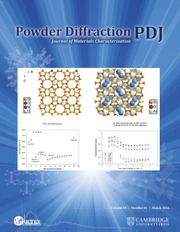Article contents
An X-ray diffraction study of filters used for atmospheric aerosol sampling
Published online by Cambridge University Press: 10 January 2013
Abstract
Characterization of some crystalline species present in atmospheric particulate matter can be investigated by an X-ray diffractometric technique. According to the analytical strategy, filtering media suitable for collecting airborne particles must be selected. In order to recognize the X-ray diffraction patterns and consequently the inherent analytical interference of filtering media, a systematic X-ray diffraction evaluation of several substrates was performed. Although artifact formation during ambient sampling can occur on quartz and glass fiber filters, these filters were also included in the diffractometric characterization. In this work, commercial filters were thermally treated and submitted to X-ray diffraction scanning. Results have shown pronounced variations in the diffractometric profiles of each thermally treated substrate. The selection criteria for choosing the filtering media was established by considering their chemical and physical properties and also the crystalline species to be collected on them.
- Type
- Research Article
- Information
- Copyright
- Copyright © Cambridge University Press 1996
- 5
- Cited by




